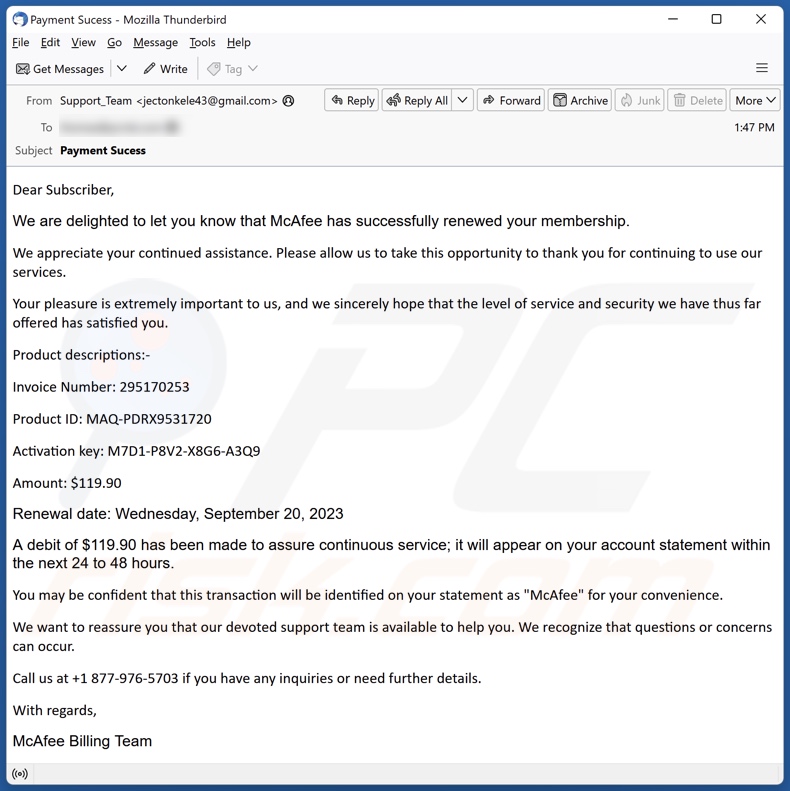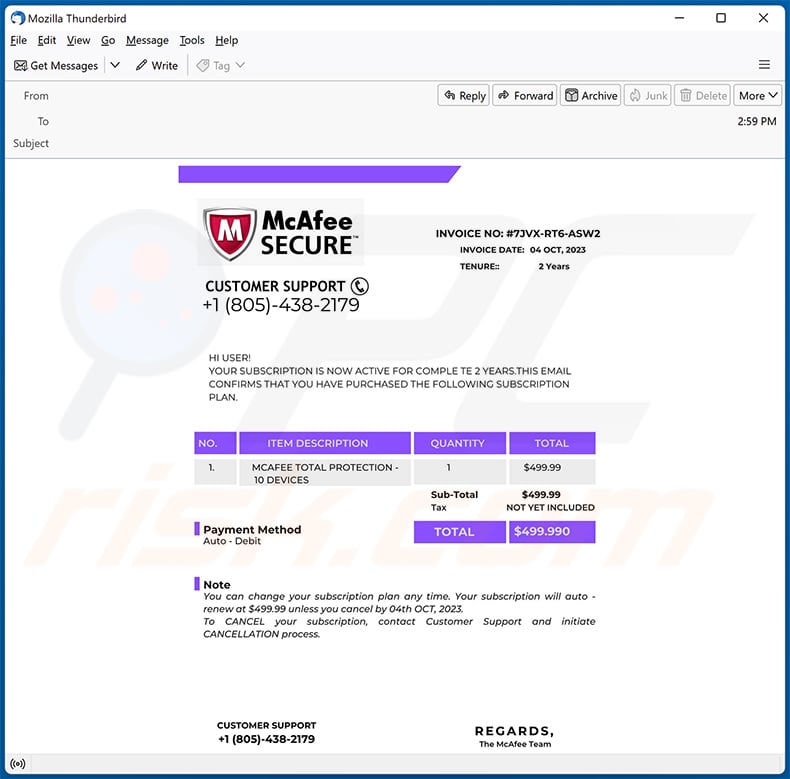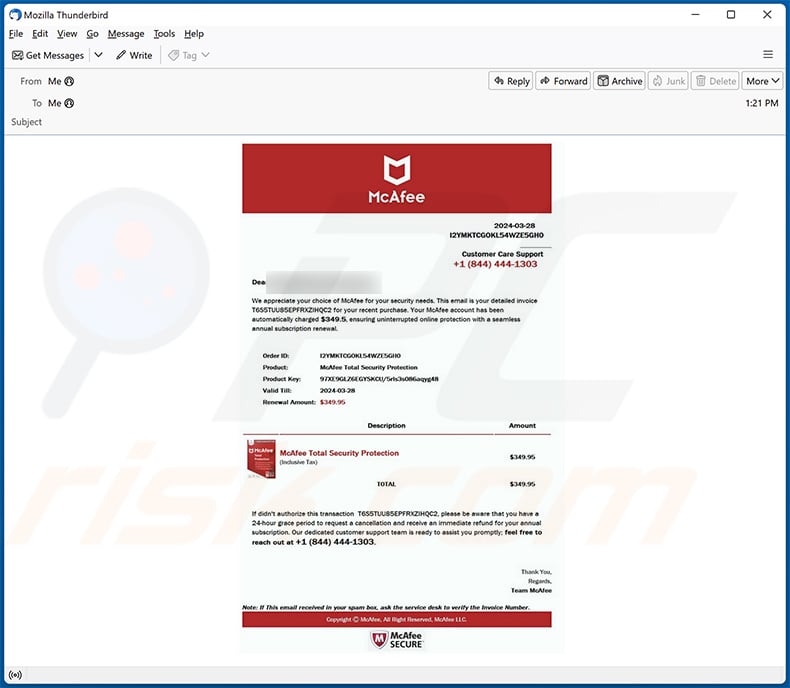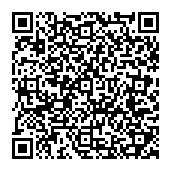Do not trust fake "McAfee Has Successfully Renewed Your Membership" emails
![]() Written by Tomas Meskauskas on (updated)
Written by Tomas Meskauskas on (updated)
What kind of email is "McAfee Has Successfully Renewed Your Membership"?
Our inspection of the "McAfee Has Successfully Renewed Your Membership" email revealed that it is spam. The email is presented as a notification from McAfee regarding membership renewal. This spam mail promotes a callback scam by deceiving users into calling a fake helpline to address or cancel the renewal fee.
It must be emphasized that all the information provided by this email is false, and this mail is in no way associated with the McAfee anti-virus or its developer – McAfee Corp.

"McAfee Has Successfully Renewed Your Membership" email scam overview
The spam email with the subject "Payment Sucess" (may vary) is disguised as a notification from McAfee. It informs the recipient that their membership has been renewed. The letter then offers platitudes and lists details of the bogus renewal. Between 24 to 48 hours, 119.90 USD will be charged to the recipient's account. For further inquiries, the email encourages to call the listed telephone number.
As mentioned in the introduction, all these claims are false, and this spam mail is not associated with McAfee Corp. Emails of this kind operate as callback scams; their goal is to deceive recipients into calling provided numbers, but how the scheme progresses from that point on may vary.
Victims can be tricked into making monetary transactions, disclosing private data, or downloading/installing malware (e.g., trojans, ransomware, cryptominers, etc.).
Information of interest can include: account log-in credentials (e.g., emails, social networking/media, e-commerce, cryptocurrency wallets, online banking, etc.), personally identifiable details, and finance-related data (e.g., banking account details, credit card numbers, etc.).
Cyber criminals may ask that the data be provided over the phone or entered into phishing websites/files. Information-stealing malware can also be used to obtain private data.
It is likely that "McAfee Has Successfully Renewed Your Membership" operates as a refund scam. In these schemes, victims are lured into allowing scammers (pretending to be support) to access their devices remotely.
This is a necessary element of tech support scams as well; more on which can be found in our articles on UltraViewer and TeamViewer – legitimate remote access programs commonly used in both tech support and refund scams.
Once cyber criminals are connected, they ask victims to sign into their bank accounts to process the cancellation/refund. The screen is then darkened on the victims' end using a feature of the remote software, and they are asked to enter the refund amount.
Meanwhile, scammers either move funds between victims' accounts (e.g., from savings to checking) or edit the webpage's HTML – to create the impression that a significantly bigger sum was transferred. It must be stressed that neither of the methods affects the money in the account.
The cyber criminals ask, demand, or beg the victims to return the nonexistent excess. It must be reiterated that no sum was actually transferred – hence, by attempting to return the funds, the victims will send their own money to scammers.
Difficult-to-trace techniques are used to acquire funds, e.g., cryptocurrencies, gift cards, pre-paid vouchers, or cash hidden in packages and shipped. It is pertinent to mention that successfully scammed victims are often targeted repeatedly.
In summary, by trusting an email like "McAfee Has Successfully Renewed Your Membership" – users can experience system infections, serious privacy issues, financial losses, and even identity theft.
If you have allowed cyber criminals to remotely access your device – first, you must disconnect it from the Internet. Second, uninstall the remote access program that the criminals used since they may not need your consent to reconnect. Last, perform a full system scan with an anti-virus and remove all detected threats.
If you have provided your log-in credentials – immediately change the passwords of all potentially exposed accounts and inform their official support. If you have disclosed other private data (e.g., ID card details, passport photos/scans, credit card numbers, etc.) – contact the appropriate authorities without delay.
| Name | "McAfee Has Successfully Renewed Your Membership" spam email |
| Threat Type | Phishing, Scam, Social Engineering, Fraud |
| Fake Claim | Recipient's McAfee membership has been renewed. |
| Disguise | McAfee |
| Support Scammer Phone Number | +1 877-976-5703, 805 285-4419, 840 788 1090, (844) 444-1303 |
| Symptoms | Unauthorized online purchases, changed online account passwords, identity theft, illegal access of the computer. |
| Distribution methods | Deceptive emails, rogue online pop-up ads, search engine poisoning techniques, misspelled domains. |
| Damage | Loss of sensitive private information, monetary loss, identity theft. |
| Malware Removal (Windows) | To eliminate possible malware infections, scan your computer with legitimate antivirus software. Our security researchers recommend using Combo Cleaner. |
Spam campaigns in general
We have analyzed thousands of spam emails; "Password Was Compromised Through A Legitimate Website", "Change Of Your Banking Details", "Email Routine Check", "Deceased Relative", and "Documents And Funds Have Been Credited" are merely some examples.
This mail is used to facilitate a wide variety of scams and even to spread malware. Spam emails/messages can be riddled with errors or be competently disguised as notifications/alerts from legitimate companies, institutions, organizations, service providers, authorities, and other entities.
How do spam campaigns infect computers?
Spam campaigns proliferate malware by sending malicious files as attachments or download links. These files can be executables (.exe, .run, etc.), archives (RAR, ZIP, etc.), documents (Microsoft Office, Microsoft OneNote, PDF, etc.), JavaScript, and so on.
When such a file is executed, run, or otherwise opened – the infection chain is initiated. For example, Microsoft Office files infect systems by executing malicious macro commands, while virulent OneNote documents require users to click embedded files/links.
How to avoid installation of malware?
We strongly recommend treating incoming emails and other messages with caution. Attachments or links found in dubious/irrelevant mail must not be opened, as they can be infectious. It is important to use Microsoft Office versions released after 2010 since they have the "Protected View" mode that prevents automatic macro execution.
However, malware is distributed using other methods as well. Hence, we advise being vigilant when browsing since fake and dangerous online content usually appears legitimate and innocuous.
Furthermore, all downloads must be performed from official and verified channels. Another recommendation is to activate and update programs by using genuine functions/tools, as illegal activation tools ("cracks") and third-party updates can contain malware.
We must stress that having a reputable anti-virus installed and kept updated is paramount to device/user safety. Security software must be used to run regular system scans and to remove threats and issues. If you've already opened malicious attachments, we recommend running a scan with Combo Cleaner Antivirus for Windows to automatically eliminate infiltrated malware.
Text presented in the "McAfee Has Successfully Renewed Your Membership" spam email letter:
Subject: Payment Sucess
Dear Subscriber,
We are delighted to let you know that McAfee has successfully renewed your membership.
We appreciate your continued assistance. Please allow us to take this opportunity to thank you for continuing to use our services.
Your pleasure is extremely important to us, and we sincerely hope that the level of service and security we have thus far offered has satisfied you.
Product descriptions:-
Invoice Number: 295170253
Product ID: MAQ-PDRX9531720
Activation key: M7D1-P8V2-X8G6-A3Q9
Amount: $119.90
Renewal date: Wednesday, September 20, 2023
A debit of $119.90 has been made to assure continuous service; it will appear on your account statement within the next 24 to 48 hours.
You may be confident that this transaction will be identified on your statement as "McAfee" for your convenience.
We want to reassure you that our devoted support team is available to help you. We recognize that questions or concerns can occur.
Call us at +1 877-976-5703 if you have any inquiries or need further details.
With regards,
McAfee Billing Team
Another example of an email from "McAfee Has Successfully Renewed Your Membership" spam campaign:

Text presented within:
McAfee SECURE
INVOICE NO: #7JVX-RT6-ASW2
INVOICE DATE: 04 OCT, 2023
TENURE:: 2 YearsCUSTOMER SUPPORT
+1 (805)-438-2179HI USER!
YOUR SUBSCRIPTION IS NOW ACTIVE FOR COMPLE TE 2 YEARS.THIS EMAIL CONFIRMS THAT YOU HAVE PURCHASED THE FOLLOWING SUBSCRIPTION PLAN.NO. ITEM DESCRIPTION QUANTITY TOTAL
1. MCAFEE TOTAL PROTECTION - 10 DEVICES 1 $499.99
Sub-Total $499.99
Tax NOT YET INCLUDEDPayment Method
Auto - Debittotal $499.990
Note
You can change your subscription plan any time. Your subscription will auto - renew at $499.99 unless you cancel by 04th OCT, 2023.
To CANCEL your subscription, contact Customer Support and initiate CANCELLATION process.CUSTOMER SUPPORT +1 (805)-438-2179
REGARDS,
The McAfee Team
Another example of an email from "McAfee Has Successfully Renewed Your Membership" spam campaign:

Text presented within:
McAfee
2024-03-28
I2YMKTCGOKL54WZE5GHOCustomer Care Support
+1 (844) 444-1303
Dear -
We appreciate your choice of McAfee for your security needs. This email is your detailed invoice - for your recent purchase. Your McAfee account has been automatically charged $349.5, ensuring interrupted online protection with a seamless annual subscription renewal.
Order ID: I2YMKTCGOKL54WZE5GHO
Product: McAfee Total Security Protection
Product Key: -
Valid Till: 2024-03-28
Renewal Amount: $349.95Description Amount
McAfee Total Security Protection $349.95
TOTAL $349.95If didn't authorize this transaction -, please be aware that you have a 24-hour grace period to request a cancellation and receive and immediate refund for your annual subscription. Our dedicated customer support team is ready to assist you promptly; feel free to reach out at +1 (844) 444-1303
Thank Your,
Regards,
Team McAfeeNote: If This email received in your spam box, ask the service desk to verify the Invoice Number.
Copyright © McAfee, All Right Reserved, McAfee LLC.
McAfee
SECURE
Instant automatic malware removal:
Manual threat removal might be a lengthy and complicated process that requires advanced IT skills. Combo Cleaner is a professional automatic malware removal tool that is recommended to get rid of malware. Download it by clicking the button below:
▼ DOWNLOAD Combo Cleaner
By downloading any software listed on this website you agree to our Privacy Policy and Terms of Use. To use full-featured product, you have to purchase a license for Combo Cleaner. 7 days free trial available. Combo Cleaner is owned and operated by Rcs Lt, the parent company of PCRisk.com read more.
Quick menu:
- What is "McAfee Has Successfully Renewed Your Membership" spam email?
- Types of malicious emails.
- How to spot a malicious email?
- What to do if you fell for an email scam?
Types of malicious emails:
![]() Phishing Emails
Phishing Emails
Most commonly, cybercriminals use deceptive emails to trick Internet users into giving away their sensitive private information, for example, login information for various online services, email accounts, or online banking information.
Such attacks are called phishing. In a phishing attack, cybercriminals usually send an email message with some popular service logo (for example, Microsoft, DHL, Amazon, Netflix), create urgency (wrong shipping address, expired password, etc.), and place a link which they hope their potential victims will click on.
After clicking the link presented in such email message, victims are redirected to a fake website that looks identical or extremely similar to the original one. Victims are then asked to enter their password, credit card details, or some other information that gets stolen by cybercriminals.
![]() Emails with Malicious Attachments
Emails with Malicious Attachments
Another popular attack vector is email spam with malicious attachments that infect users' computers with malware. Malicious attachments usually carry trojans that are capable of stealing passwords, banking information, and other sensitive information.
In such attacks, cybercriminals' main goal is to trick their potential victims into opening an infected email attachment. To achieve this goal, email messages usually talk about recently received invoices, faxes, or voice messages.
If a potential victim falls for the lure and opens the attachment, their computers get infected, and cybercriminals can collect a lot of sensitive information.
While it's a more complicated method to steal personal information (spam filters and antivirus programs usually detect such attempts), if successful, cybercriminals can get a much wider array of data and can collect information for a long period of time.
![]() Sextortion Emails
Sextortion Emails
This is a type of phishing. In this case, users receive an email claiming that a cybercriminal could access the webcam of the potential victim and has a video recording of one's masturbation.
To get rid of the video, victims are asked to pay a ransom (usually using Bitcoin or another cryptocurrency). Nevertheless, all of these claims are false - users who receive such emails should ignore and delete them.
How to spot a malicious email?
While cyber criminals try to make their lure emails look trustworthy, here are some things that you should look for when trying to spot a phishing email:
- Check the sender's ("from") email address: Hover your mouse over the "from" address and check if it's legitimate. For example, if you received an email from Microsoft, be sure to check if the email address is @microsoft.com and not something suspicious like @m1crosoft.com, @microsfot.com, @account-security-noreply.com, etc.
- Check for generic greetings: If the greeting in the email is "Dear user", "Dear @youremail.com", "Dear valued customer", this should raise suspiciousness. Most commonly, companies call you by your name. Lack of this information could signal a phishing attempt.
- Check the links in the email: Hover your mouse over the link presented in the email, if the link that appears seems suspicious, don't click it. For example, if you received an email from Microsoft and the link in the email shows that it will go to firebasestorage.googleapis.com/v0... you shouldn't trust it. It's best not to click any links in the emails but to visit the company website that sent you the email in the first place.
- Don't blindly trust email attachments: Most commonly, legitimate companies will ask you to log in to their website and to view any documents there; if you received an email with an attachment, it's a good idea to scan it with an antivirus application. Infected email attachments are a common attack vector used by cybercriminals.
To minimise the risk of opening phishing and malicious emails we recommend using Combo Cleaner Antivirus for Windows.
Example of a spam email:

What to do if you fell for an email scam?
- If you clicked on a link in a phishing email and entered your password - be sure to change your password as soon as possible. Usually, cybercriminals collect stolen credentials and then sell them to other groups that use them for malicious purposes. If you change your password in a timely manner, there's a chance that criminals won't have enough time to do any damage.
- If you entered your credit card information - contact your bank as soon as possible and explain the situation. There's a good chance that you will need to cancel your compromised credit card and get a new one.
- If you see any signs of identity theft - you should immediately contact the Federal Trade Commission. This institution will collect information about your situation and create a personal recovery plan.
- If you opened a malicious attachment - your computer is probably infected, you should scan it with a reputable antivirus application. For this purpose, we recommend using Combo Cleaner Antivirus for Windows.
- Help other Internet users - report phishing emails to Anti-Phishing Working Group, FBI’s Internet Crime Complaint Center, National Fraud Information Center and U.S. Department of Justice.
Frequently Asked Questions (FAQ)
Why did I receive this email?
Cyber criminals send these emails in large-scale campaigns – therefore, thousands of users receive identical messages.
I have allowed cyber criminals to remotely access my computer, what should I do?
If you have allowed cyber criminals to remotely access your computer – you must first disconnect it from the Internet. Afterward, remove the remote access software that the criminals used (e.g., TeamViewer, UltraViewer, AnyDesk, etc.), as they may not need your permission to reconnect. Lastly, perform a complete system scan with an anti-virus and eliminate all detected threats.
I have provided my personal information when tricked by this spam email, what should I do?
If you have provided your log-in credentials – change the passwords of all possibly compromised accounts and inform their official support without delay. And if you have disclosed your private information (e.g., ID card details, credit card numbers, etc.) – immediately contact relevant authorities.
I have read a spam email but didn't open the attachment, is my computer infected?
Devices are infected when malicious attachments or links are opened – hence, merely reading an email is harmless.
I have downloaded and opened a file attached to a spam email, is my computer infected?
Whether your device was infected might depend on the opened file's format. If it was an executable (.exe, .run, etc.) – most likely, yes. However, you might have avoided a compromise if it was a document (.doc, .xls, .one, .pdf, etc.). These formats may require additional actions (e.g., enabling macro commands, clicking embedded content, etc.) to start downloading/installing malware.
Will Combo Cleaner remove malware infections present in email attachments?
Yes, Combo Cleaner is designed to detect and remove threats. It can eliminate practically all known malware infections. Note that since sophisticated malicious programs typically hide deep within systems – running a full system scan is crucial.


▼ Show Discussion